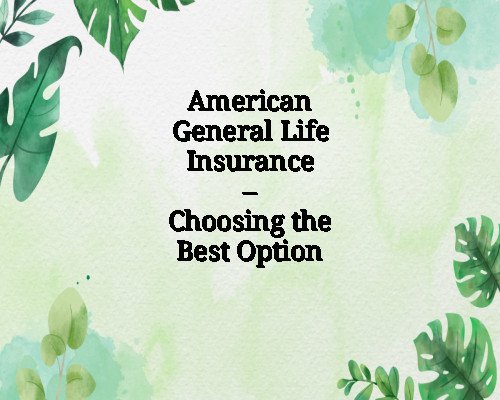American General Life Insurance – Choosing the Best Option
When it comes to securing your family’s future, life insurance is an essential financial tool. Among the various providers in the market, American General Life Insurance (now part of AIG) has built a reputation for offering diverse and customizable insurance policies. Whether you’re considering life insurance for the first time or looking to switch providers, understanding the different options available is key to making an informed decision. In this article, we’ll explore the various life insurance options offered by American General Life Insurance, helping you choose the best plan for your needs.
Understanding American General Life Insurance
American General Life Insurance, now under the umbrella of AIG, offers a range of life insurance products designed to meet the unique needs of individuals and families. The company has been providing financial security for policyholders for decades, and its life insurance offerings are known for their flexibility, customer service, and variety. The primary goal of these policies is to provide financial protection for loved ones in the event of the policyholder’s death.
Types of Life Insurance Offered by American General
American General Life Insurance provides several life insurance options, each tailored to different needs. Below, we’ll break down the most common types of policies available.
Term Life Insurance
Term life insurance is one of the most affordable and straightforward options for individuals seeking temporary coverage. With term life insurance from American General, you pay premiums for a set period, typically ranging from 10 to 30 years. If you pass away during this term, your beneficiaries will receive a death benefit. However, if the term expires and you outlive the policy, no benefit is paid.
Advantages of Term Life Insurance:
-
Affordability: Term life insurance is generally the least expensive option, especially for young and healthy individuals.
-
Simple and straightforward: This policy offers basic coverage without the complexity of investment options.
-
Flexible term lengths: American General offers a variety of term lengths to suit your needs.
When to Choose Term Life:
-
If you need coverage for a specific period (such as until your children are grown or your mortgage is paid off).
-
If you’re on a budget and need affordable coverage.
-
If you’re looking for a simple, no-fuss policy.
Permanent Life Insurance
Permanent life insurance is a more long-term option that provides lifelong coverage, as long as the premiums are paid. American General offers two main types of permanent life insurance: whole life insurance and universal life insurance.
Whole Life Insurance
Whole life insurance provides coverage for your entire life and includes a savings component called the “cash value.” This cash value grows over time and can be borrowed against or used to pay premiums.
Advantages of Whole Life Insurance:
-
Lifetime coverage: Whole life insurance guarantees that your beneficiaries will receive a death benefit whenever you pass away.
-
Cash value accumulation: The policy builds cash value that can grow over time and be used for loans or premium payments.
-
Fixed premiums: Your premiums remain the same throughout the life of the policy.
When to Choose Whole Life Insurance:
-
If you want a permanent insurance policy with a guaranteed death benefit.
-
If you are interested in building cash value that can be accessed later.
-
If you prefer predictable premiums that won’t increase over time.
Universal Life Insurance
Universal life insurance offers more flexibility than whole life insurance. It provides permanent coverage and allows you to adjust your premiums and death benefits as your needs change. It also includes a cash value component, but the cash value growth is tied to interest rates.
Advantages of Universal Life Insurance:
-
Flexibility: You can adjust your premiums and death benefit as your financial situation changes.
-
Cash value growth: Like whole life, universal life insurance accumulates cash value over time.
-
Potential for higher returns: The cash value growth may be higher than that of whole life insurance due to interest rate variations.
When to Choose Universal Life Insurance:
-
If you want more flexibility with premiums and coverage amounts.
-
If you want permanent coverage but with the potential for growth in cash value.
-
If you anticipate changes in your financial situation and want the ability to adjust your policy.
Variable Life Insurance
Variable life insurance is another type of permanent life insurance that provides coverage for your lifetime and includes an investment component. With variable life insurance, the cash value can be invested in a variety of separate accounts, such as stocks, bonds, or mutual funds. The performance of these investments will determine the growth of your cash value.
Advantages of Variable Life Insurance:
-
Investment opportunities: You have the potential to grow your cash value faster through investments in the market.
-
Flexible premiums and death benefits: You can adjust both the premiums and death benefit based on your needs.
-
Lifelong coverage: Like other permanent policies, variable life insurance offers coverage for your entire life.
When to Choose Variable Life Insurance:
-
If you are comfortable with investment risk and want the opportunity to grow your cash value faster.
-
If you are looking for permanent coverage with flexible options.
-
If you want to customize your policy and take an active role in managing your investments.
Choosing the Best American General Life Insurance Option
The best life insurance policy for you will depend on your financial situation, long-term goals, and the level of flexibility you desire. Here are some key considerations to help you choose the best option for your needs:
1. Determine Your Coverage Needs
Start by assessing how much coverage you need. Consider factors like:
-
Your family’s financial needs in the event of your death.
-
Mortgage or debt obligations.
-
Education costs for children or other dependents.
-
Your long-term goals, such as leaving an inheritance or charitable donations.
2. Evaluate Your Budget
Consider how much you can afford to spend on premiums each month. Term life insurance tends to be the most affordable option, while permanent life insurance options (like whole or universal life) can be more expensive. Make sure you select a policy that fits within your budget without straining your finances.
3. Consider Your Financial Goals
Do you want to build cash value over time or simply have coverage for a fixed period? If you’re looking for an investment component and flexibility, permanent life insurance may be the right choice. However, if you just need straightforward, affordable coverage, term life insurance might be a better fit.
4. Think About Flexibility
If your needs or financial situation are likely to change in the future, you may want a policy that offers flexibility in terms of premiums, coverage, and cash value growth. Universal and variable life insurance options offer this kind of flexibility.
Conclusion
Choosing the best American General Life Insurance option depends on your personal circumstances and goals. Whether you opt for term life insurance, whole life, universal life, or variable life insurance, understanding the benefits and limitations of each policy will help you make a well-informed decision. Take your time to assess your coverage needs, budget, and long-term financial goals before committing to a policy. With the right life insurance, you can secure peace of mind knowing that your loved ones will be financially protected, no matter what the future holds.

